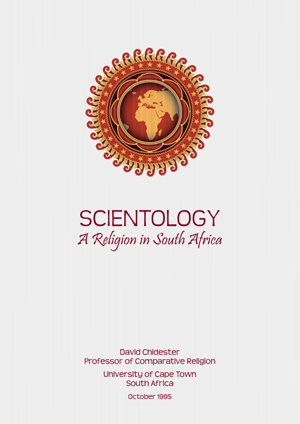ABOUT THE EXPERTISE
In this article from 1995, Professor David Chidester provides a scholarly examination of the Church of Scientology—its beliefs, rituals, ethics, experiences, organization and history—in the South African context. There are numerous Churches in South Africa, not to mention across the African continent at large. Even more, the Founder of Dianetics and Scientology, L. Ron Hubbard, had a particular fondness for South Africa and its peoples, traveling to Johannesburg for an extended stay in 1960. During his time there, he drafted a “one man, one vote” constitution for a country that was still under the shackles of apartheid. His former home is now restored as an L. Ron Hubbard Landmark Site and open for tours. Dr. Chidester’s article examines aspects of this history but is mostly concerned with examining and analyzing features of the religious nature and history of Scientology, especially in the barely post-apartheid context in which his piece was originally written. “In a new South Africa,” he concludes, “the Church of Scientology has assumed its position within the country’s rich fabric of religious diversity.… As a religion that is both old and new, the Church of Scientology has continued to advance religious aspirations that have gained adherents all over the world. At the very least, the Church of Scientology merits continued recognition and attention as a religion in South Africa.”
BIOGRAPHY
David Chidester, Ph.D., is professor of comparative religion and director of the Institute for Comparative Religion in Southern Africa at the University of Cape Town. An internationally acclaimed scholar in the field of comparative religion he has written prolifically on his research interests, which include religion and popular culture, religion and society, religion and globalization, religion and education, and religion in North America and South Africa. Dr. Chidester is the author of hundreds of articles and more than thirty authored and co-edited books, including Religions of South Africa (1992); Nelson Mandela: From Freedom to the Future (coedited, 2004); Interfaith Solidarity: A Guide for Religious Communities (coauthored, 2004); Authentic Fakes: Religion and American Popular Culture (2005); and Empire of Religion: Imperialism and Comparative Religion (2014). He has twice been honored with an Award for Excellence in the Study of Religion from the American Academy of Religion. In 2005, he received the Alan J. Pifer Award for social research from the National Research Foundation of South Africa.

Scientology, Social Science and the Definition of Religion
by James A. Beckford, Professor of Sociology, University of Warwick, England

Social Change and New Religious Movements
by Bryan R. Wilson,
Emeritus Fellow in Sociology, Oxford University

The Church of Scientology
by Juha Pentikäinen, Marja Pentikäinen, University of Helsinki, Finland

The Relationship Between Scientology and Other Religions
by Fumio Sawada, Eighth holder of the secrets of Yu-itsu Shinto, the oldest religion in Japan; President, Ahlul-Bait Center

The Religious Nature of Scientology
by Geoffrey Parrinder, Methodist minister, Professor, Comparative Study of Religions, University of London

Religious Philosophy, Religion and Church
by G.C. Oosthuizen, Professor of Science of Religion, University of Durban-Westville, Natal, South Africa

Scientology a New Religion
by M. Darrol Bryant, Department of Religious Studies, Renison College, University of Waterloo, Ontario, Canada

Apostates and New Religious Movements
by Bryan R. Wilson,
Emeritus Fellow in Sociology, Oxford University

Scientology: An Analysis and Comparison of its Religious Systems and Doctrines
by Bryan R. Wilson,
Emeritus Fellow in Sociology, Oxford University

The Reliability of Apostate Testimony About New Religious Movements
by Lonnie D. Kliever Ph.D., Professor of Religious Studies

The Sea Organization and its Role Within the Church of Scientology
by Frank K. Flinn Ph.D. Adjunct Professor in Religious Studies

Brief Analyses of the Religious Nature of Scientology
by J. Gordon Melton, Baylor University, Samuel Hill, Gary Bouma, Irving Hexham

Congregational Services of the Church of Scientology
by Bryan R. Wilson,
Emeritus Fellow in Sociology, Oxford University

Is Scientology A Religion?
by Alan W. Black, Associate Professor of Sociology, University of New England, Armidale, New South Wales, Australia

Is Scientology a Religion?
by Dean M. Kelley, National Council of Churches

Religious Toleration & Religious Diversity
by Bryan R. Wilson,
Emeritus Fellow in Sociology, Oxford University

Scientology A Religion In South Africa
by David Chidester, Professor of Comparative Religion, University of Cape Town, South Africa

Scientology: A True Religion
by Urbano Alonso Galan, Professor of Philosophy and Theology, Gregorian University of Rome

Scientology: A Way of Spiritual Self-Identification
by Michael Sivertsev, Moscow Academy of Sciences

Scientology: A Worshipping Community
by Lonnie D. Kliever, Southern Methodist University, Dallas, Texas

Scientology and Contemporary Definitions of Religion in the Social Sciences
by Alejandro Frigerio, Professor of Sociology, Catholic University of Argentina, Buenos Aires

Scientology and Islam an Analogous Study
by Fumio Sawada, Eighth holder of the secrets of Yu-itsu Shinto, the oldest religion in Japan; President, Ahlul-Bait Center

Scientology and Religion
by Christiaan Vonck, Rector, Faculty for Comparative Study of Religion, Antwerp, Belgium

Scientology: A Comparison with Religions of the East and West
by Per-Arne Berglie, Professor of History of Religion, University of Stockholm

Scientology Its Cosmology, Anthropology, System of Ethics and Methodologies
by Régis Dericquebourg, Professor of Sociology of Religion, University of Lille III, France

Scientology – Its Historical-Morphological Frame
by Dario Sabbatucci, Professor of History of Religions, University of Rome

Scientology: Its True Nature
by Harri Heino, Professor of Theology, University of Tampere, Finland

Scientology: The Marks of Religion
by Frank K. Flinn, Adjunct Professor of Religious Studies Washington University

